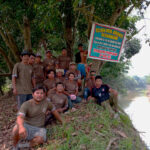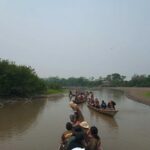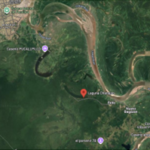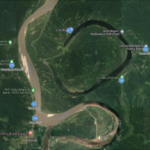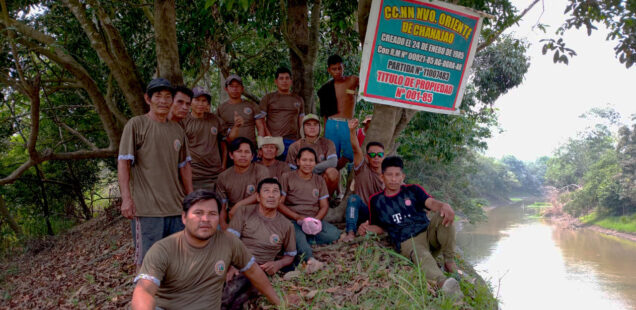
The Guardias Indigenas of the Shipibo-Konibo communities and COSHICOX govern and protect the watersheds of their territories in the Ucayali region of the Peruvian Amazon
Historically, the territory’s watersheds have served as geographic backbone of the political organisation of the people Shipibo, in the Peruvian Amazon. The current emphasis on their protection stems from the understanding that watersheds are essential to both the health of the ecosystem and the livelihoods of local communities. Indeed, water bodies are also places of incredibly rich biodiversity, and therefore crucial to the ecosystems of the entire Amazon.
With the experience gained from their pioneer work on the Imiría Lagoon, the Guardias Indigenas of the Shipibo-Konibo communities and the Shipibo Conibo Xetebo Council (COSHIKOX) have demonstrated the strategic effectiveness of protecting watersheds to defend the well-being of entire territories and their inhabitants. With the support of the Shipibo Conibo Center of NY and of the Institute of Legal Defence, the first Indigenous Ecological Area was created in the Imiria Lagoon in 2022. The Indigenous Ecological Areas are territories protected by their indigenous communities— an authentic and autonomous model of conservation as opposed to models directed by the state or international institutions.
Indigenous territories titled and managed collectively by Indigenous communities continue to have the lowest rates of deforestation and the highest levels of biodiversity in the Amazon and worldwide. This reality has nourished many nature conservation efforts. However, the link between the protection of lakes, ponds and watersheds, the preservation of a healthy forest system and the fact that they are jointly governed by their Indigenous peoples has rarely been taken into account. COSHICOX asserts and demonstrates today that water health and forest health are inextricably linked, and both depend on the well-being of the indigenous communities living near them and the viability of their livelihoods there.
The defence of water and waterways is a central concern in the ecological struggles of the Shipibo people. For them, the defence of water and the defence of the forest go hand in hand and it is for the sake of both that the Guardias Indigenas are strengthening river surveillance, aiming at the elimination of commercial and illegal fishing in the lagoons. The process is enriched by legal training, which provides legal tools for the defence of the water bodies, so that the communities that have proclaimed the Indigenous Ecological Areas know their rights and can defend themselves in case of intimidations or threats. The legal strategy has been successful in some important litigation aimed at pressuring authorities for official recognition of Indigenous Ecological Areas.
The initiative supported by the Paul K. Feyerabend Foundation continues its previous partial support to these legal processes and the protection of water and forest defenders. It focuses on the institutional strengthening of Guardias Indigenas to demarcate and geo-reference their territories and monitor their boundaries in water bodies – essential elements of local territorial defence. The Foundation’s support will contribute to the acquisition of patrolling equipment such as boats, boots and uniforms and cover the operational costs of petrol, travel and food for the surveillance in the native communities of the Tipishca (Roya, Puerto Belén, Villasol and Utucuro) and Chanajao lagoons. It will also guarantee the training of the leaders of the Guardias Indigenas on issues of rights, climate change and political cosmovision.

